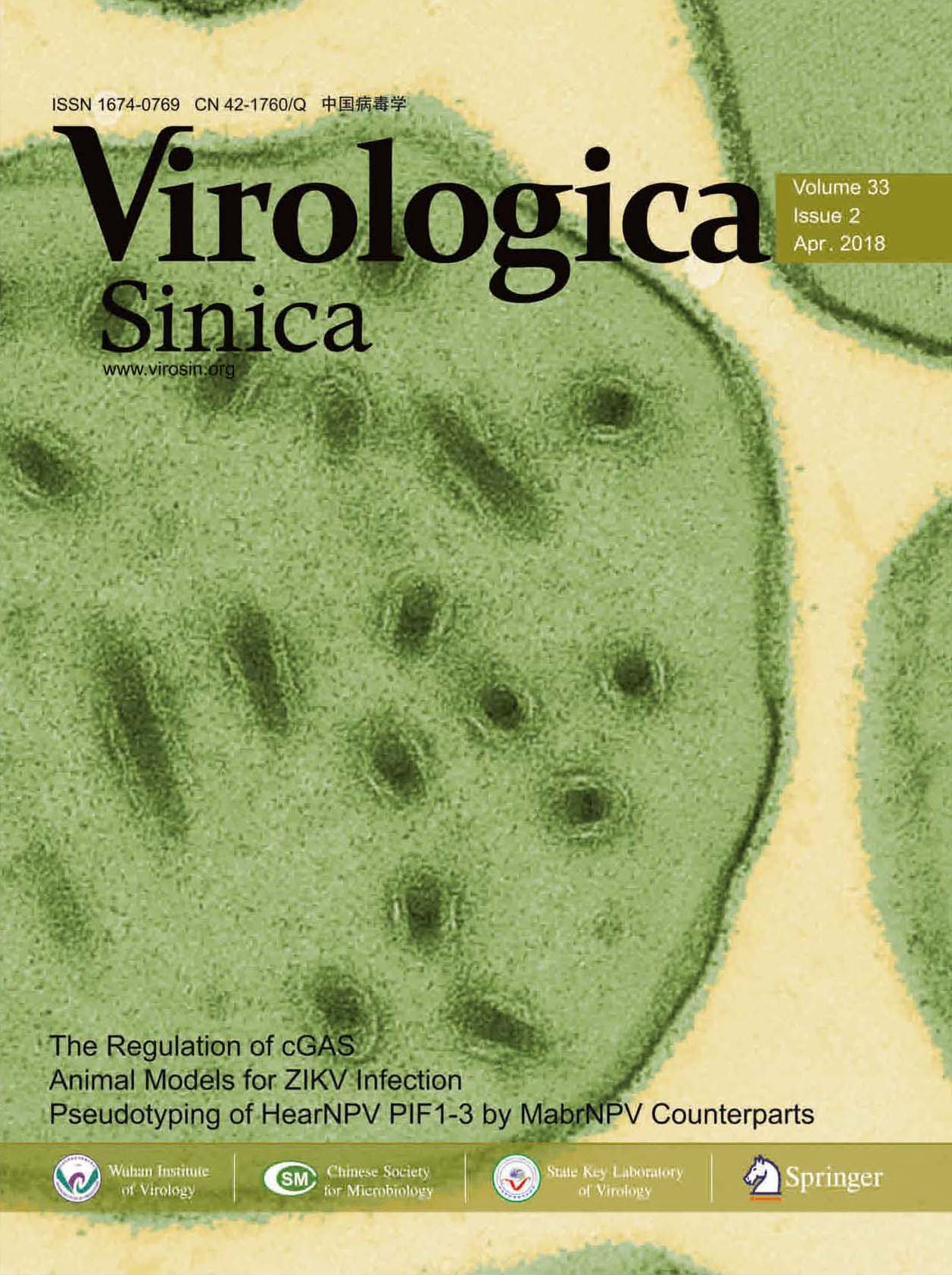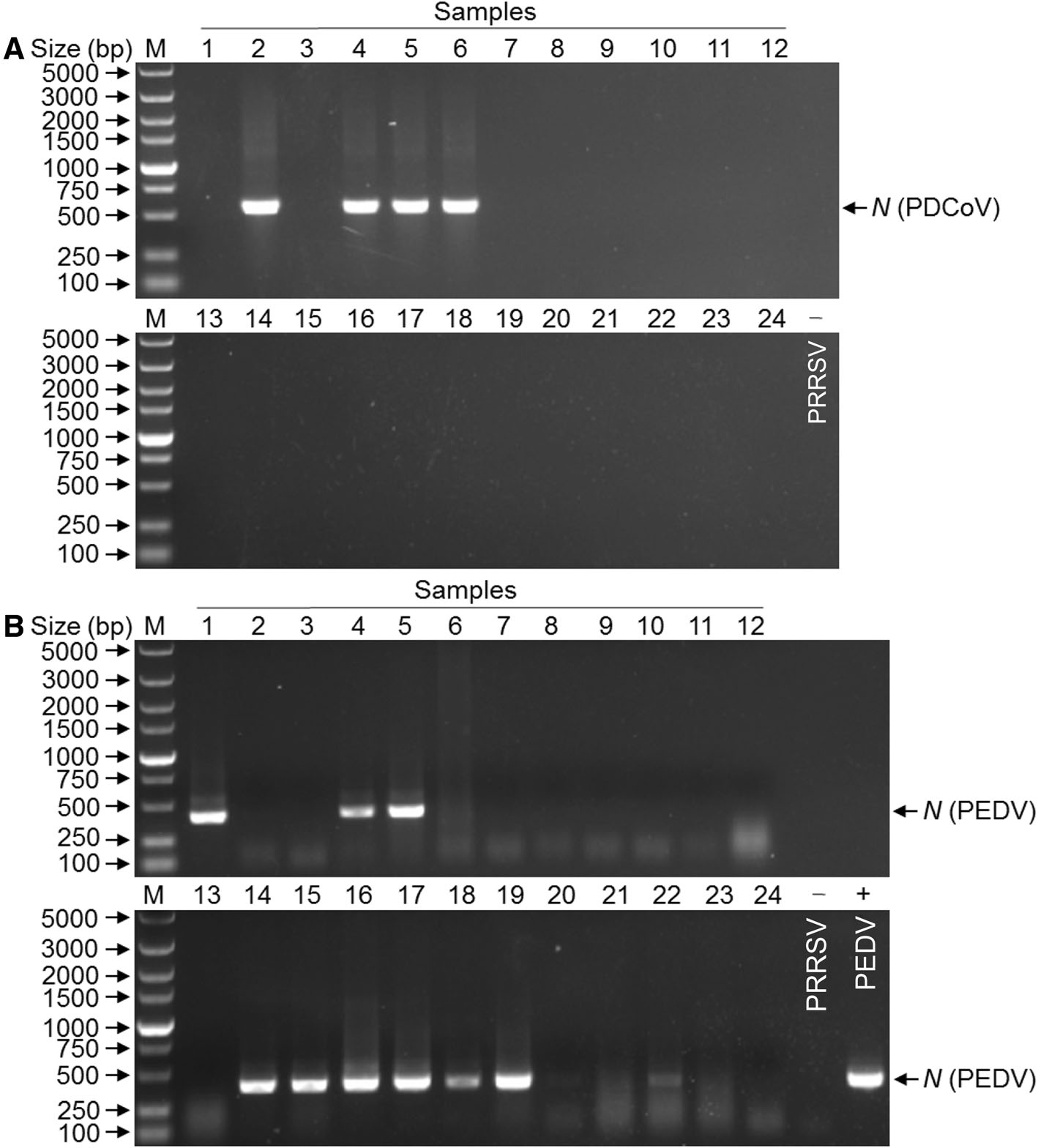-
Chen F, Zhu Y, Wu M, Ku X, Yao L, He Q (2015a) Full-length genome characterization of Chinese porcine deltacoronavirus strain CH/SXD1/2015. Genome Announc 3:e01284
-
Chen Q, Gauger P, Stafne M, Thomas J, Arruda P, Burrough E, Madson D, Brodie J, Magstadt D, Derscheid R, Welch M, Zhang J (2015b) Pathogenicity and pathogenesis of a United States porcine deltacoronavirus cell culture isolate in 5-day-old neonatal piglets. Virology 482:51–59
doi: 10.1016/j.virol.2015.03.024
-
Chen Q, Gauger PC, Stafne MR, Thomas JT, Madson DM, Huang H, Zheng Y, Li G, Zhang J (2016) Pathogenesis comparison between the United States porcine epidemic diarrhoea virus prototype and S-INDEL-variant strains in conventional neonatal piglets. J Gen Virol 97:1107–1121
doi: 10.1099/jgv.0.000419
-
Dong N, Fang L, Yang H, Liu H, Du T, Fang P, Wang D, Chen H, Xiao S (2016) Isolation, genomic characterization, and pathogenicity of a Chinese porcine deltacoronavirus strain CHN-HN-2014. Vet Microbiol 196:98–106
doi: 10.1016/j.vetmic.2016.10.022
-
Doyle LP, Hutchings LM (1946) A transmissible gastroenteritis in pigs. J Am Vet Med Assoc 108:257–259
-
Hu H, Jung K, Vlasova AN, Chepngeno J, Lu Z, Wang Q, Saif LJ (2015a) Isolation and characterization of porcine deltacoronavirus from pigs with diarrhea in the United States. J Clin Microbiol 53:1537–1548
doi: 10.1128/JCM.00031-15
-
Hu X Jr, Li N Jr, Tian Z Jr, Yin X Jr, Qu L, Qu J (2015b) Molecular characterization and phylogenetic analysis of transmissible gastroenteritis virus HX strain isolated from China. BMC Vet Res 11:72
doi: 10.1186/s12917-015-0387-8
-
Hu H, Jung K, Vlasova AN, Saif LJ (2016) Experimental infection of gnotobiotic pigs with the cell-culture-adapted porcine deltacoronavirus strain OH-FD22. Arch Virol 161:3421–3434
doi: 10.1007/s00705-016-3056-8
-
Hull RN, Cherry WR, Weaver GW (1976) The origin and characteristics of a pig kidney cell strain, LLC-PK. In Vitro 12:670–677
doi: 10.1007/BF02797469
-
Jeong YJ, Park SI, Hosmillo M, Shin DJ, Chun YH, Kim HJ, Kwon HJ, Kang SY, Woo SK, Park SJ, Kim GY, Kang MI, Cho KO (2009) Detection and molecular characterization of porcine group C rotaviruses in South Korea. Vet Microbiol 138:217–224
doi: 10.1016/j.vetmic.2009.03.024
-
Jung K, Hu H, Eyerly B, Lu Z, Chepngeno J, Saif LJ (2015) Pathogenicity of 2 porcine deltacoronavirus strains in gnotobiotic Pigs. Emerg Infect Dis 21:650–654
doi: 10.3201/eid2104.141859
-
Kong Q, Xue C, Ren X, Zhang C, Li L, Shu D, Bi Y, Cao Y (2013) Proteomic analysis of purified coronavirus infectious bronchitis virus particles. Proteomic Sci 8:29
-
Lee S, Lee C (2014) Complete genome characterization of korean porcine deltacoronavirus strain KOR/KNU14-04/2014. Genome Announc 2:e01191
-
Ma Y, Zhang Y, Liang X, Lou F, Oglesbee M, Krakowka S, Li J (2015) Origin, evolution, and virulence of porcine deltacoronaviruses in the United States. Mbio 6:e00064
-
Madson DM, Magstadt DR, Arruda PH, Hoang H, Sun D, Bower LP, Bhandari M, Burrough ER, Gauger PC, Pillatzki AE, Stevenson GW, Wilberts BL, Brodie J, Harmon KM, Wang C, Main RG, Zhang J, Yoon KJ (2014) Pathogenesis of porcine epidemic diarrhea virus isolate (US/Iowa/18984/2013) in 3-week-old weaned pigs. Vet Microbiol 174:60–68
doi: 10.1016/j.vetmic.2014.09.002
-
Malboeuf CM, Yang X, Charlebois P, Qu J, Berlin AM, Casali M, Pesko KN, Boutwell CL, Devincenzo JP, Ebel GD, Allen TM, Zody MC, Henn MR, Levin JZ (2013) Complete viral RNA genome sequencing of ultra-low copy samples by sequenceindependent amplification. Nucleic Acids Res 41:e13
doi: 10.1093/nar/gks794
-
Marthaler D, Raymond L, Jiang Y, Collins J, Rossow K, Rovira A (2014) Rapid detection, complete genome sequencing, and phylogenetic analysis of porcine deltacoronavirus. Emerg Infec Dis 20:1347–1350
-
Pensaert MB, De Bouck PD (1978) A new coronavirus-like particle associated with diarrhea in swine. Arch Virol 58:243–247
doi: 10.1007/BF01317606
-
Reed LJ, Muench H (1938) A simple method of estimating of fifty per cent endpoints. Am J Epidemiol 27:493–497
doi: 10.1093/oxfordjournals.aje.a118408
-
Saeng-Chuto K, Lorsirigool A, Temeeyasen G, Vui DT, Stott CJ, Madapong A, Tripipat T, Wegner M, Intrakamhaeng M, Chongcharoen W, Tantituvanont A, Kaewprommal P, Piriyapongsa J, Nilubol D (2017) Different lineage of porcine deltacoronavirus in Thailand, Vietnam and Lao PDR in 2015. Transbound Emerg Dis 64:3–10
doi: 10.1111/tbed.2017.64.issue-1
-
Sasseville AM, Boutin M, Gé linas AM, Dea S (2002) Sequence of the 30-terminal end (8.1 kb) of the genome of porcine haemagglutinating encephalomyelitis virus: comparison with other haemagglutinating coronaviruses. J Gen Virol 83:2411–2416
-
Song D, Zhou X, Peng Q, Chen Y, Zhang F, Huang T, Zhang T, Li A, Huang D, Wu Q, He H, Tang Y (2015) Newly emerged porcine deltacoronavirus associated with diarrhoea in swine in China: identification, prevalence and full-length genome sequence analysis. Transbound Emerg Dis 62:575–580
doi: 10.1111/tbed.2015.62.issue-6
-
Su M, Li C, Guo D, Wei S, Wang X, Geng Y, Yao S, Gao J, Wang E, Zhao X, Wang Z, Wang J, Wu R, Feng L, Sun D (2016) A recombinant nucleocapsid protein-based indirect enzyme-linked immunosorbentassay to detect antibodies against porcine deltacoronavirus. J Vet Med Sci 78:601–606
doi: 10.1292/jvms.15-0533
-
Wang L, Byrum B, Zhang Y (2014a) Detection and genetic characterization of deltacoronavirus in pigs, Ohio, USA, 2014. Emerg Infect Dis 20:1227–1230
-
Wang L, Byrum B, Zhang Y (2014b) Porcine coronavirus HKU15 detected in 9 US States, 2014. Emerg Infect Dis 20:1594–1595
doi: 10.3201/eid2009.140756
-
Wang YW, Yue H, Fang W, Huang YW (2015) Complete genome sequence of porcine deltacoronavirus strain CH/Sichuan/S27/ 2012 from Mainland China. Genome Announc 3:e00945
-
Wesley RD, Woods RD, Hill HT, Biwer JD (1990) Evidence for a porcine respiratory coronavirus, antigenically similar to transmissible gastroenteritis virus, in the United States. J Vet Diagn Invest 2:312–317
doi: 10.1177/104063879000200411
-
Woo PCY, Yi H, Lau SKP, Kwok-Yung Y (2010) Coronavirus genomics and bioinformatics analysis. Viruses 2:1804–1820
doi: 10.3390/v2081803
-
Woo PC, Lau SK, Lam CS, Lau CC, Tsang AK, Lau JH, Bai R, Teng JL, Tsang CC, Wang M, Zheng BJ, Chan KH, Yuen KY (2012) Discovery of seven novel mammalian and avian coronaviruses in the genus deltacoronavirus supports bat coronaviruses as the gene source of alphacoronavirus and betacoronavirus and avian coronaviruses as the gene source of gammacoronavirus and deltacoronavirus. J Virol 86:3995–4008
doi: 10.1128/JVI.06540-11
-
Zhai SL, Wei WK, Li XP, Wen XH, Zhou X, Zhang H, Lv DH, Li F, Wang D (2016) Occurrence and sequence analysis of porcine deltacoronaviruses in southern China. Virol J 13:136
doi: 10.1186/s12985-016-0591-6
-
Zhang J (2016) Porcine deltacoronavirus: overview of infection dynamics, diagnostic methods, prevalence and genetic evolution. Virus Res 226:71–84
doi: 10.1016/j.virusres.2016.05.028












